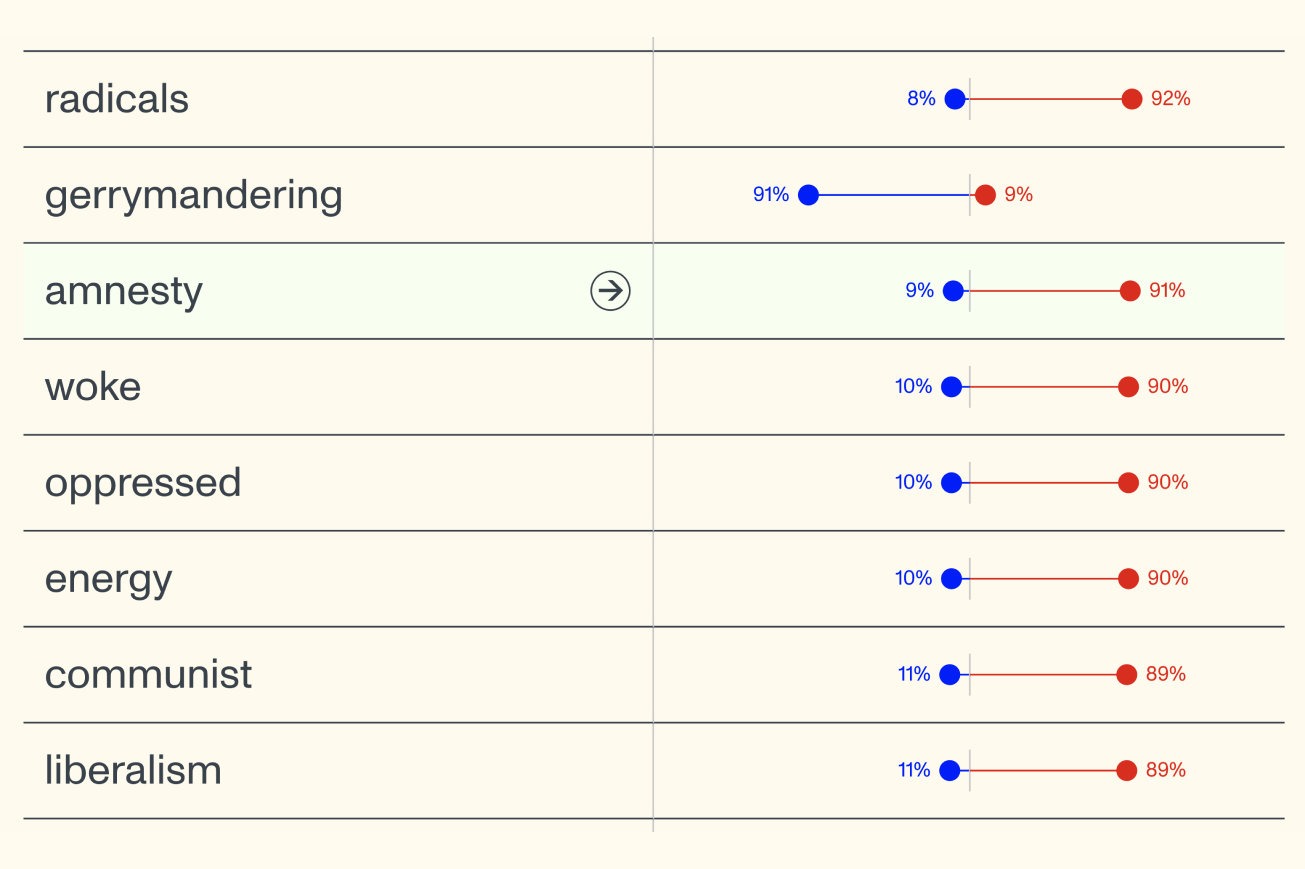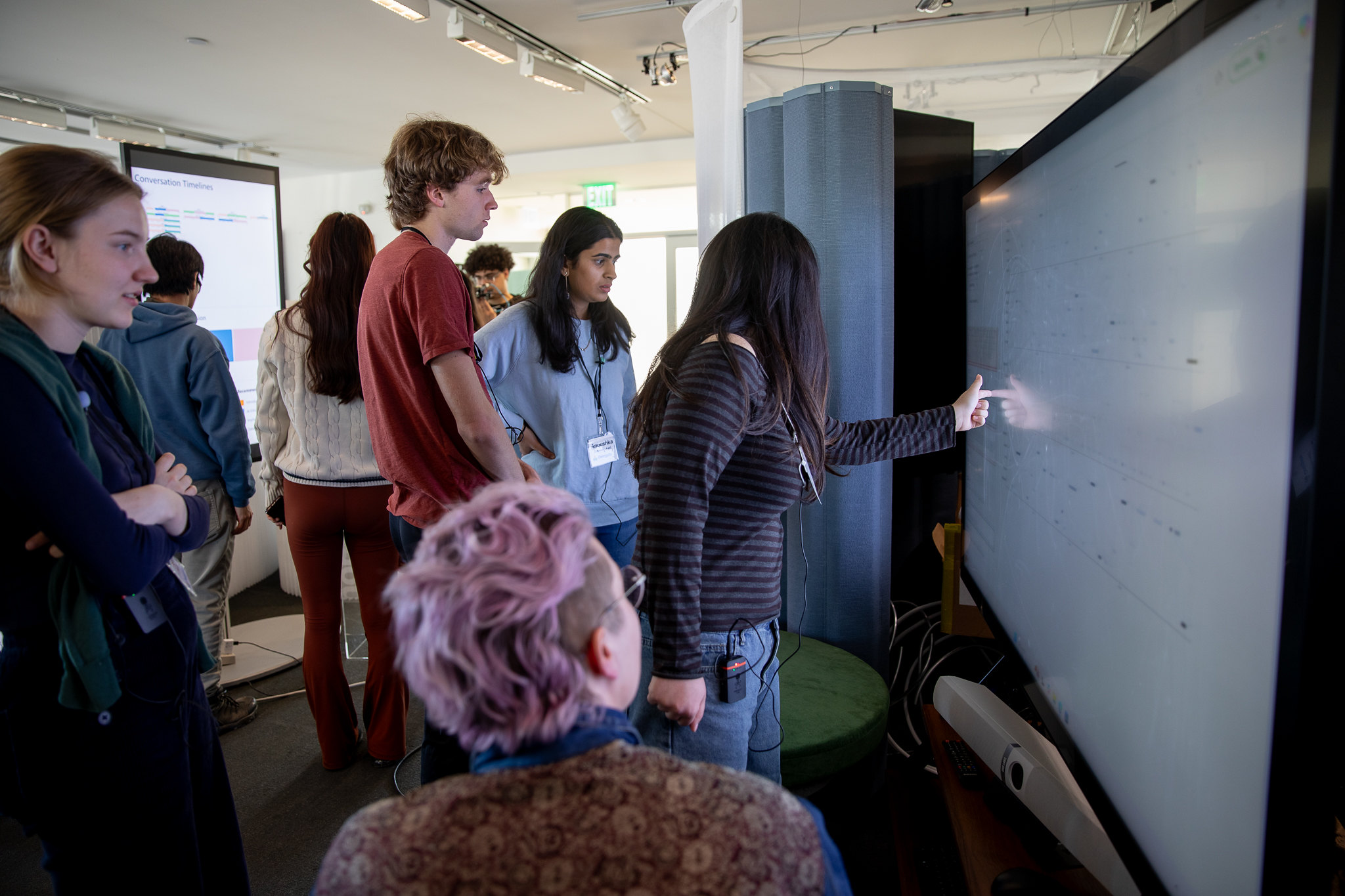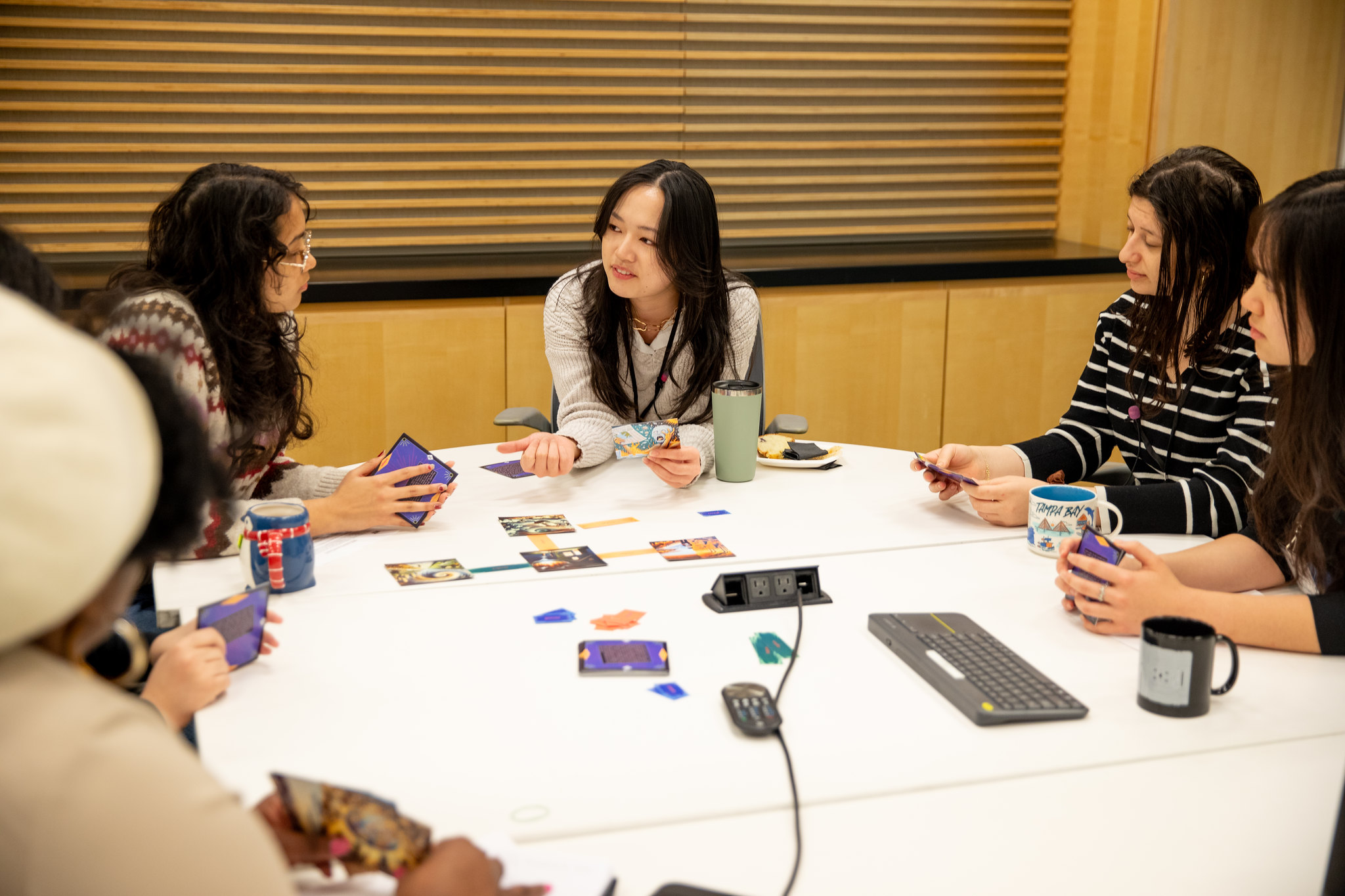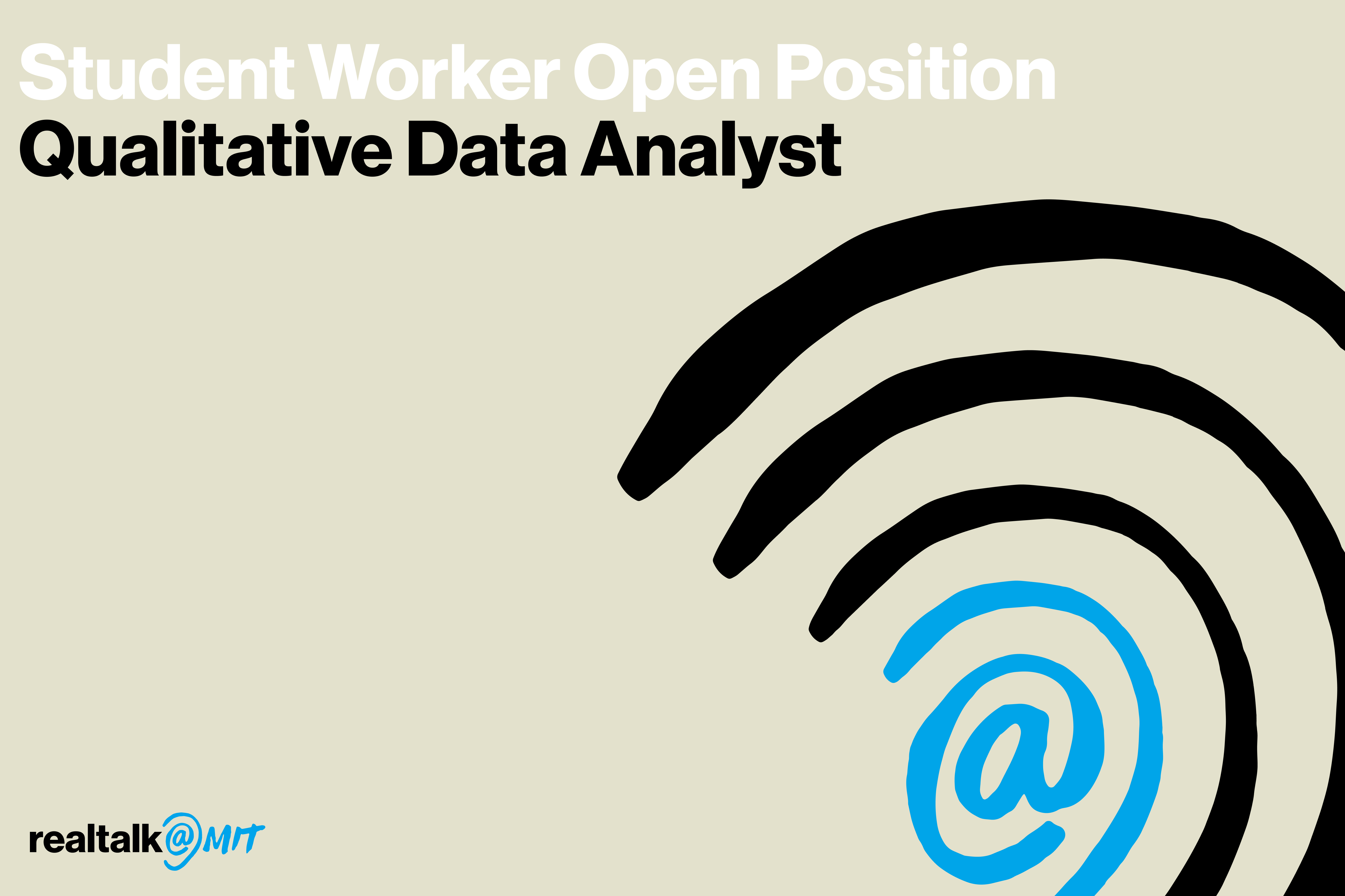Hearing the humanity in others through trustworthy communication channels is necessary for democracies, communities, and institutions to function.
Informed by years of social media and media analytics, CCC’s work combines the ancient wisdoms of human conversation with emerging digital technologies to promote shared understanding and trust rather than reinforcing the “side-taking” and binary thinking that too often divides us. Based at the MIT Media Lab and working closely with the non-profit Cortico, CCC brings together researchers in AI, computational social science, digital interactive design, and learning technologies with software engineers, journalists, political scientists, designers, and community organizations.
What’s New
Introducing the Bridging Dictionary
Could seeing how opposite sides of the US political spectrum use the same words differently be a first step toward greater cross-political understanding?
On January 7, CCC launched the Bridging Dictionary (BD), an interactive web-based prototype that uses natural language processing to identify the different ways two media outlets – foxnews.com on the right and msnbc.com on the left – assign different meanings to the same words and phrases, and then attempts to suggest less polarized (bridging) alternatives.
News
CCC and DemNext take the first step towards developing a more transparent, inclusive democratic process
By audio recording and analyzing the entirety of the citizens’ assembly process, researchers make strides in understanding what drives effective deliberation
In a landmark achievement, MIT CCC and DemocracyNext have collaborated on the first-of-its-kind, tech-enhanced citizens’ assembly in Deschutes County, Oregon. 12,750 invitation letters were mailed to residents across Central Oregon. Of the respondents, 30 delegates were chosen via sortition (lottery), to be broadly representative of the area.
News
CCC hosts its second Tech-Enhanced Student Assembly
MIT undergraduates use a Citizens’ Assembly format to draw on their individual values and experiences to offer options for improved sustainability efforts on the MIT campus
MIT undergraduates use a Citizens’ Assembly format to draw on their individual values and experiences to offer options for improved sustainability efforts on the MIT campus
News
CCC launches a inaugural student advisory board
These seven undergraduate MIT students will be among those advising CCC on its research areas and programs.
MIT CCC is launching a student advisory board to help shape its ongoing research as well as student programming via realtalk@MIT. This group of undergraduates will contribute to the development of student-facing initiatives, provide input on outreach efforts, and help create environments where their peers feel comfortable engaging in deep and honest conversation.
News
Introducing the Bridging Dictionary
Could seeing how opposite sides of the US political spectrum use the same words differently be a first step toward greater cross-political understanding?
On January 7, CCC launched the Bridging Dictionary (BD), an interactive web-based prototype that uses natural language processing to identify the different ways two media outlets – foxnews.com on the right and msnbc.com on the left – assign different meanings to the same words and phrases, and then attempts to suggest less polarized (bridging) alternatives.
News
CCC and DemNext take the first step towards developing a more transparent, inclusive democratic process
By audio recording and analyzing the entirety of the citizens’ assembly process, researchers make strides in understanding what drives effective deliberation
In a landmark achievement, MIT CCC and DemocracyNext have collaborated on the first-of-its-kind, tech-enhanced citizens’ assembly in Deschutes County, Oregon. 12,750 invitation letters were mailed to residents across Central Oregon. Of the respondents, 30 delegates were chosen via sortition (lottery), to be broadly representative of the area.
News
CCC hosts its second Tech-Enhanced Student Assembly
MIT undergraduates use a Citizens’ Assembly format to draw on their individual values and experiences to offer options for improved sustainability efforts on the MIT campus
MIT undergraduates use a Citizens’ Assembly format to draw on their individual values and experiences to offer options for improved sustainability efforts on the MIT campus
News
CCC launches a inaugural student advisory board
These seven undergraduate MIT students will be among those advising CCC on its research areas and programs.
MIT CCC is launching a student advisory board to help shape its ongoing research as well as student programming via realtalk@MIT. This group of undergraduates will contribute to the development of student-facing initiatives, provide input on outreach efforts, and help create environments where their peers feel comfortable engaging in deep and honest conversation.
News
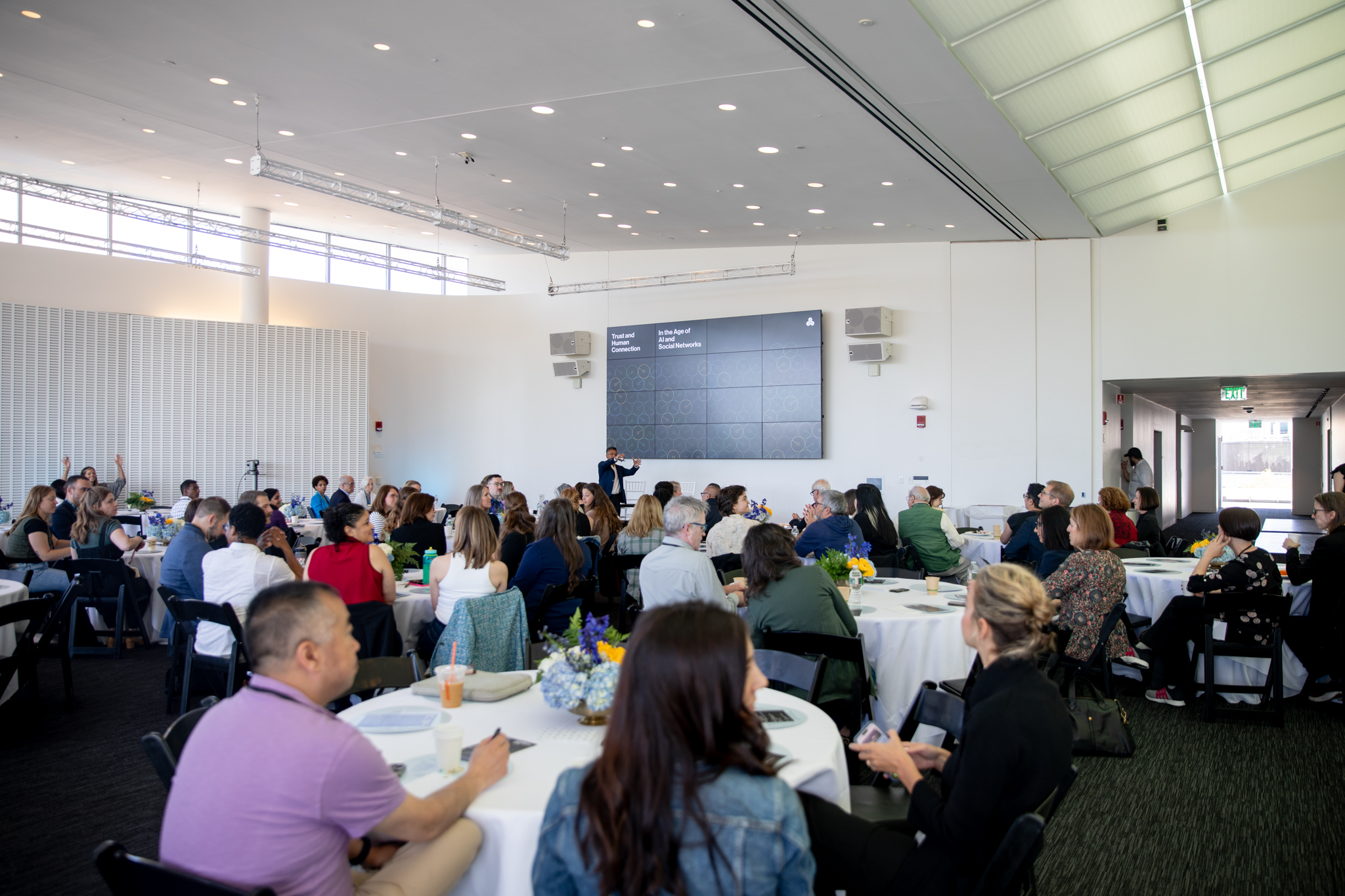
Second annual CCC in-person event: Trust and Human Connection in the Age of Social Networks and AI
On May 7, 2024 more than 150 attendees, including many from CCC’s closely affiliated non-profit, Cortico, spent a full day at MIT engaging in conversation and explorati…
News
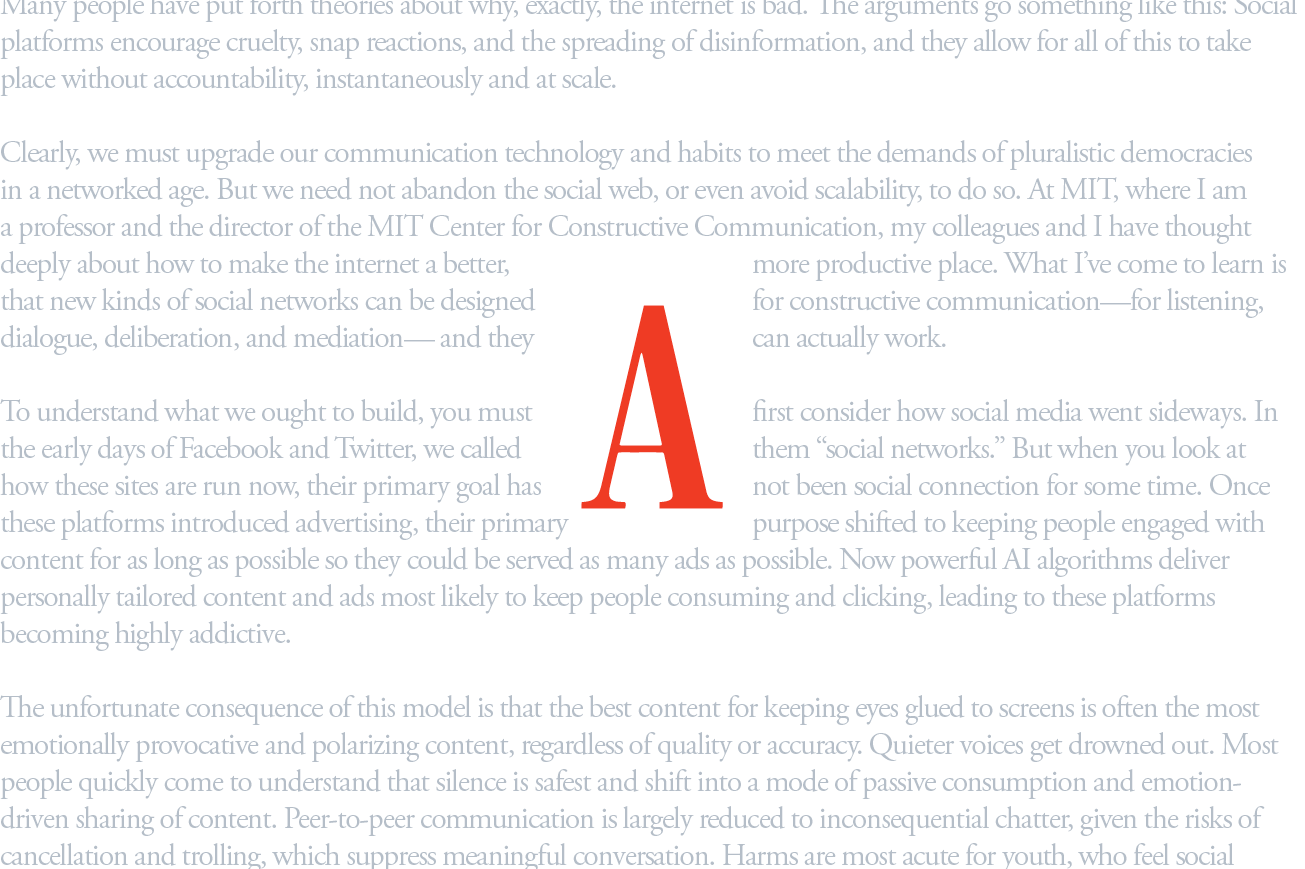
Deb Roy’s Atlantic article proposes healthy social networks
In The Atlantic, CCC Director Deb Roy writes about the very real threat today’s social media platforms pose to our democracy, and presents a far less toxic alternative:…
News
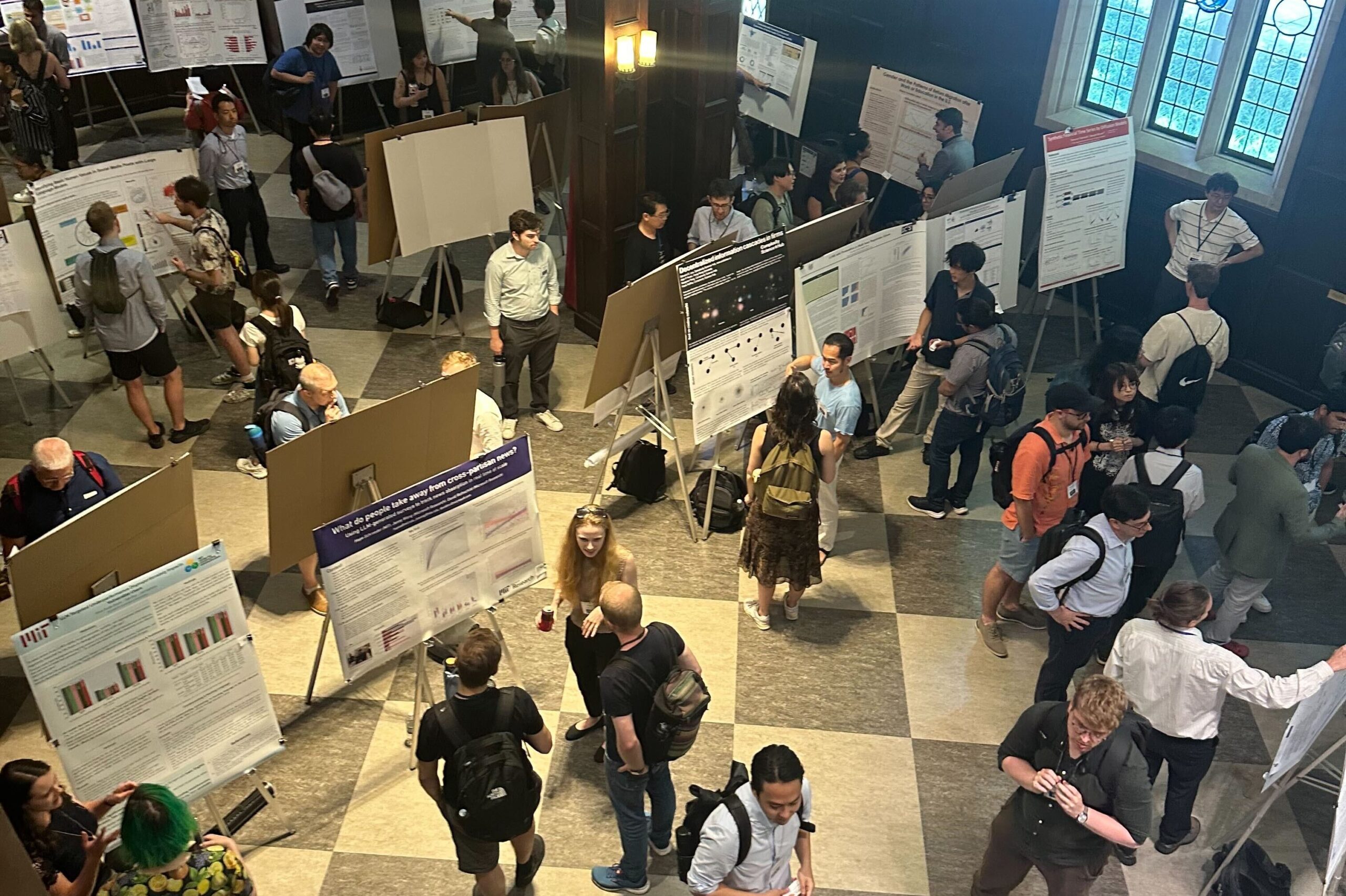
MIT CCC graduate students and research staff present at the 10th International Conference for Computational Social Science (IC2S2)
CCC graduate students Belén Saldías, Hope Schroeder, Elinor Poole-Dayan, Will Brannon, Hang Jiang, and CCC research engineer Doug Beeferman, presented at the 10th Inter…
News
Research

How to Tackle Truth Decay | The Atlantic | Deb Roy
The next stage of truth decay is that those who no longer trust the scientists and technocrats search for alternative sources of information, “truth” from outside the…
News
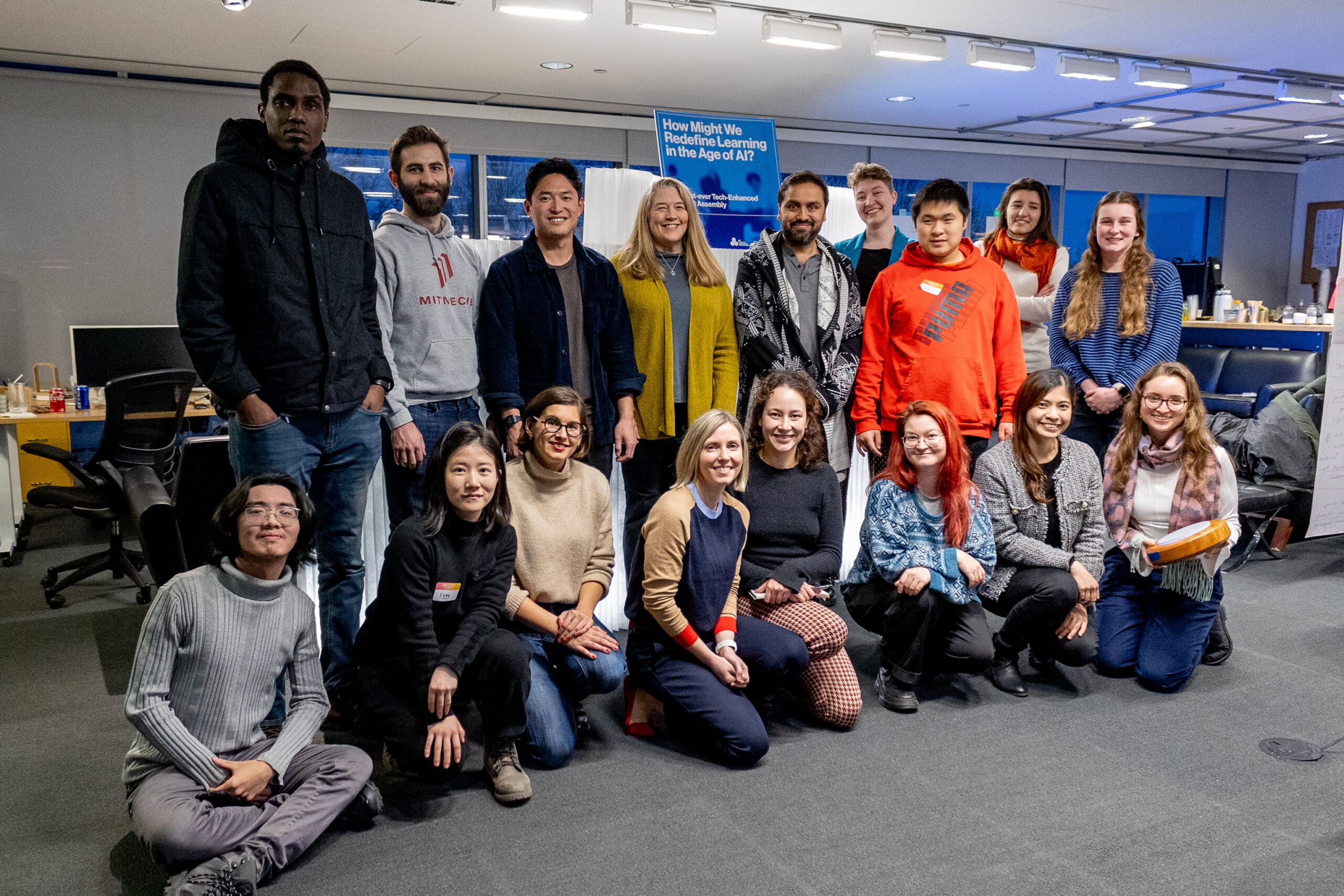
CCC and DemocracyNext hosted the First-Ever Tech-Enhanced Student Assembly
The MIT Center for Constructive Communication (CCC) and the non-profit DemocracyNext came together to design and implement the first tech-enhanced and student-focused ver…
News
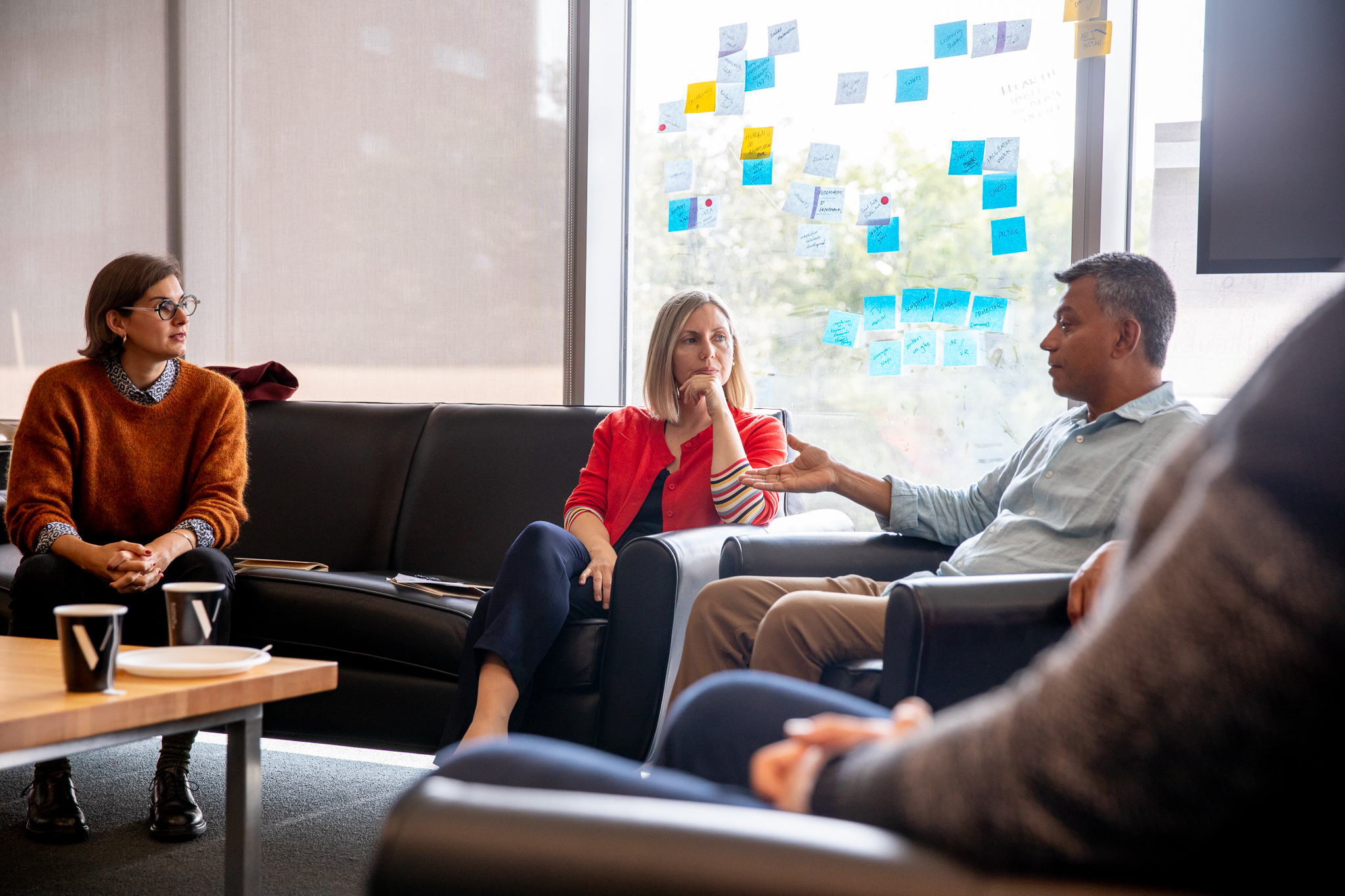
CCC and DemocracyNext Announce Tech-Enhanced Pop-Up Lab to Advance Citizens’ Assemblies
In an era of technological transformation in which social media and generative AI are disrupting our processes of communication and democracy, the MIT Center for Construc…
News
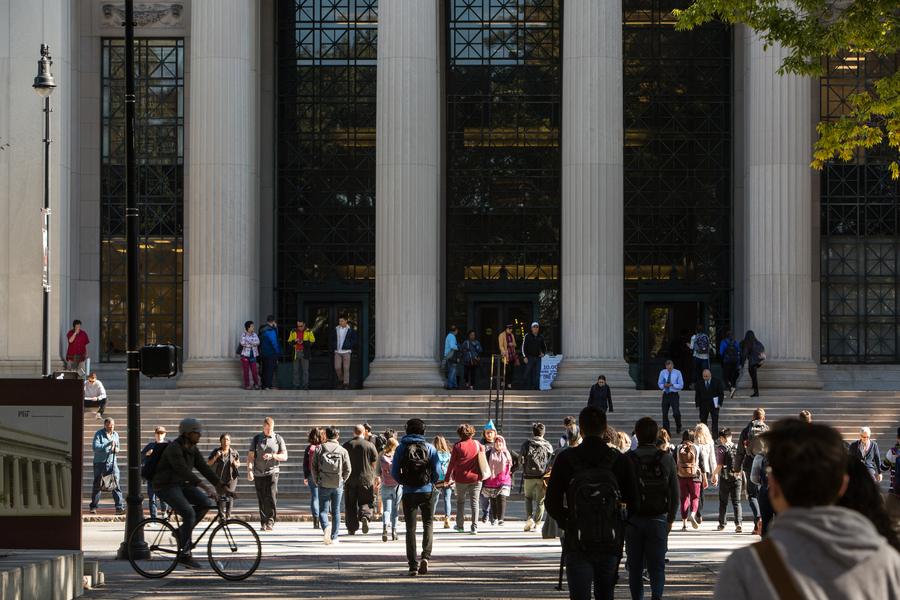
CCC’s RealTalk@MIT Part of Campus-Wide Efforts to Encourage Civil Discourse
MIT Chancellor Melissa Nobel notes CCC’s RealTalk@MIT efforts as part of the Institute’s response to addressing antisemitism and Islamophobia through MIT’s new “Standing…
News
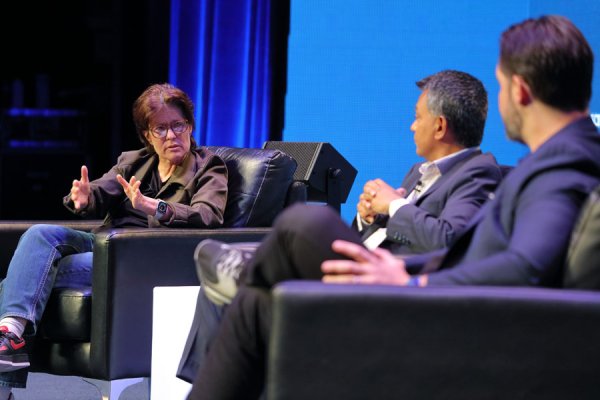
Big Tech’s Effect on Democracy | Democracy360
The relationship between technology and democracy has become increasingly complex from the proliferation of social media to recent advances in AI. Kara Swisher moderates…
News
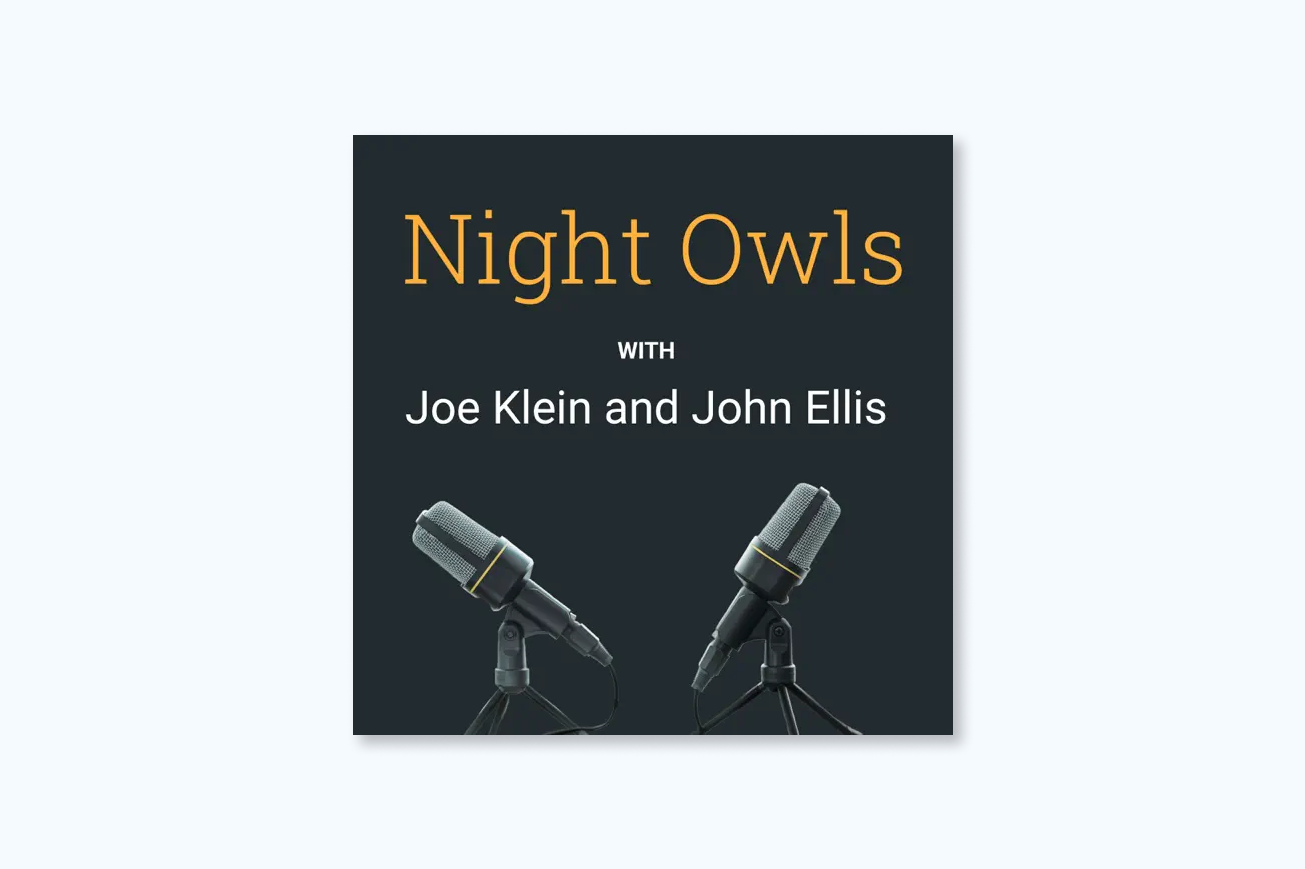
MIT Center for Constructive Communication’s Work Featured on Night Owls Podcast
MIT Center for Constructive Communication (CCC) and its nonprofit collaborator Cortico are at the forefront of using technology and dialogue to foster deeper connections…
News

Study: Some language reward models exhibit political bias
Large language models (LLMs) that drive generative artificial intelligence apps, such as ChatGPT, have been proliferating at lightning speed and have improved to the poin…
News
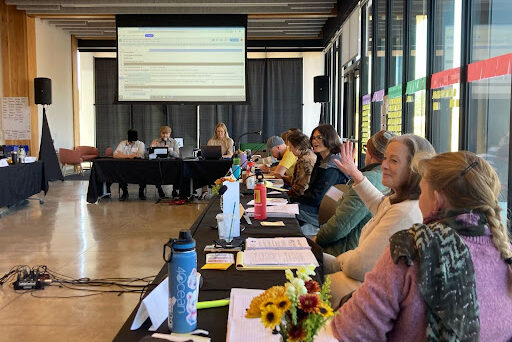
CCC and DemNext take the first step towards developing a more transparent, inclusive democratic process
In a landmark achievement, MIT CCC and DemocracyNext have collaborated on the first-of-its-kind, tech-enhanced citizens’ assembly in Deschutes County, Oregon. 12,750 in…
News
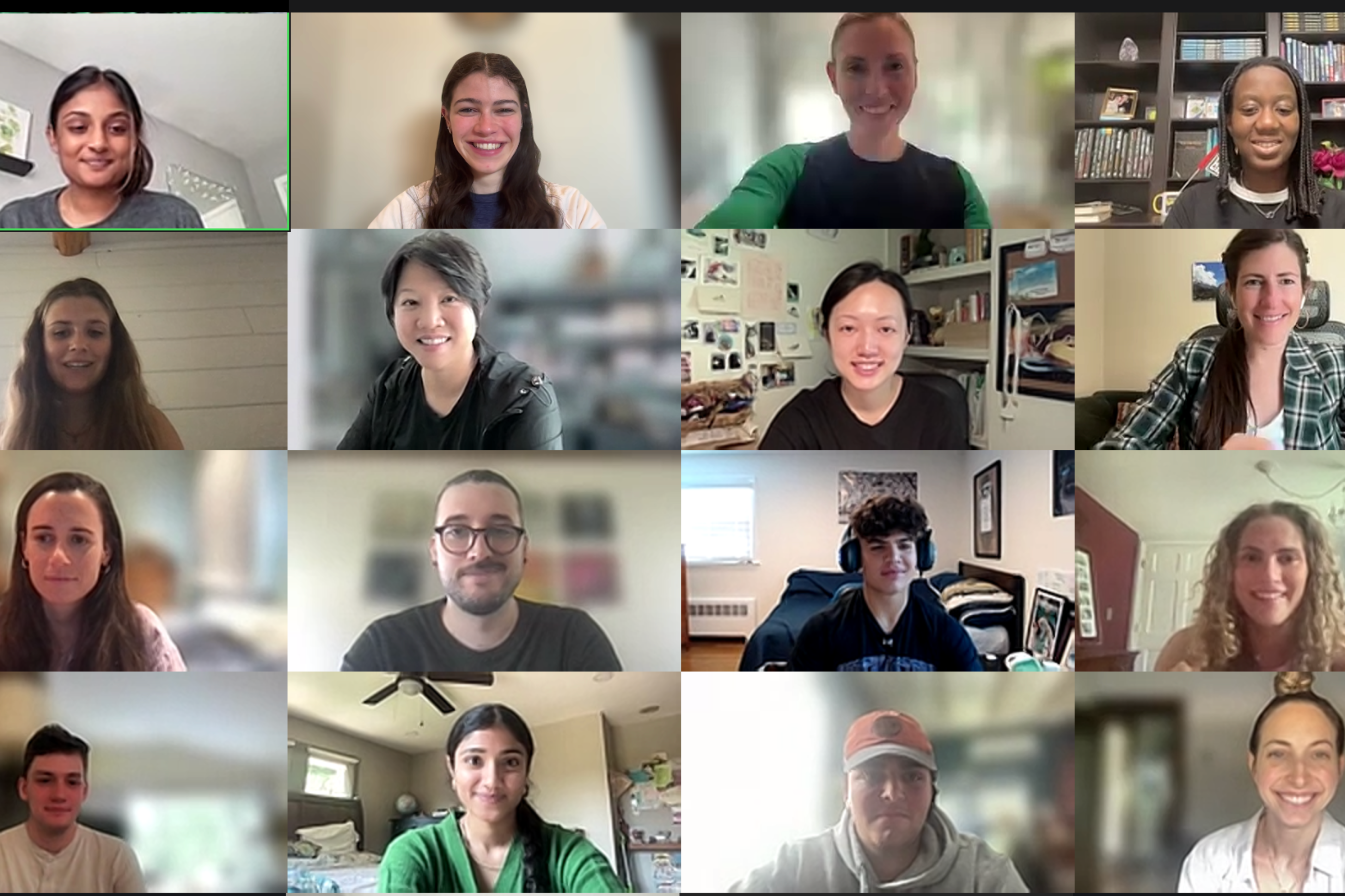
CCC and FRONTLINE launched a listening experiment to build a social dialogue network with youth
In collaboration with FRONTLINE, the PBS documentary series produced at GBH in Boston, the MIT Center for Constructive Communication (CCC) has been exploring how small g…
News
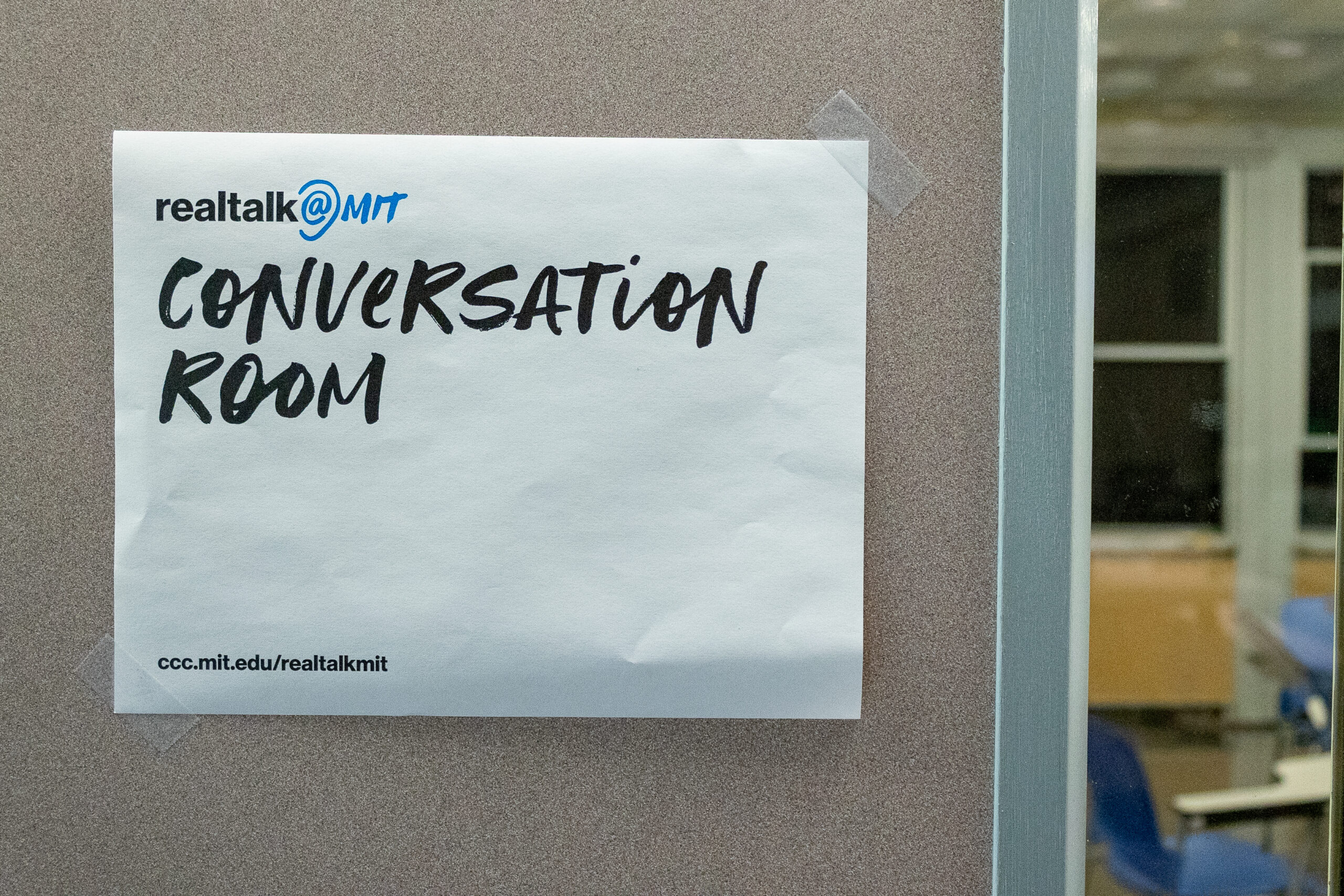
realtalk@MIT: Using AI to bring human conversation to life
In today’s digital age, words and information are everywhere—flooding our feeds, congesting our inboxes, and pinging us with text messages. Yet, written words can nev…
News
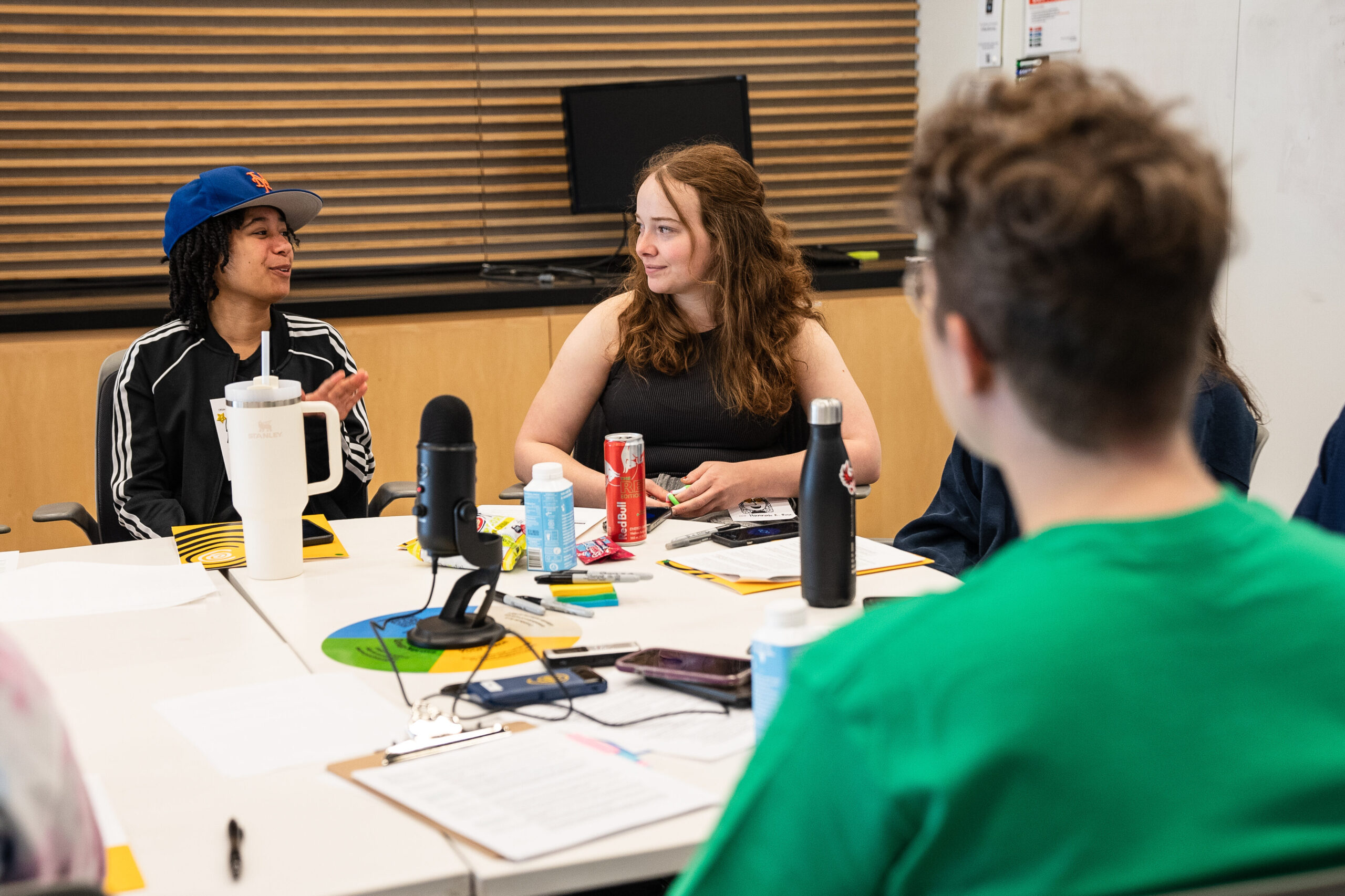
CCC launched realtalk@MIT for incoming students to connect, learn, and share their experiences
In August, CCC trained over 70 students to effectively facilitate small-group conversations, also recording and highlighting many of these conversations on the newly deve…
News
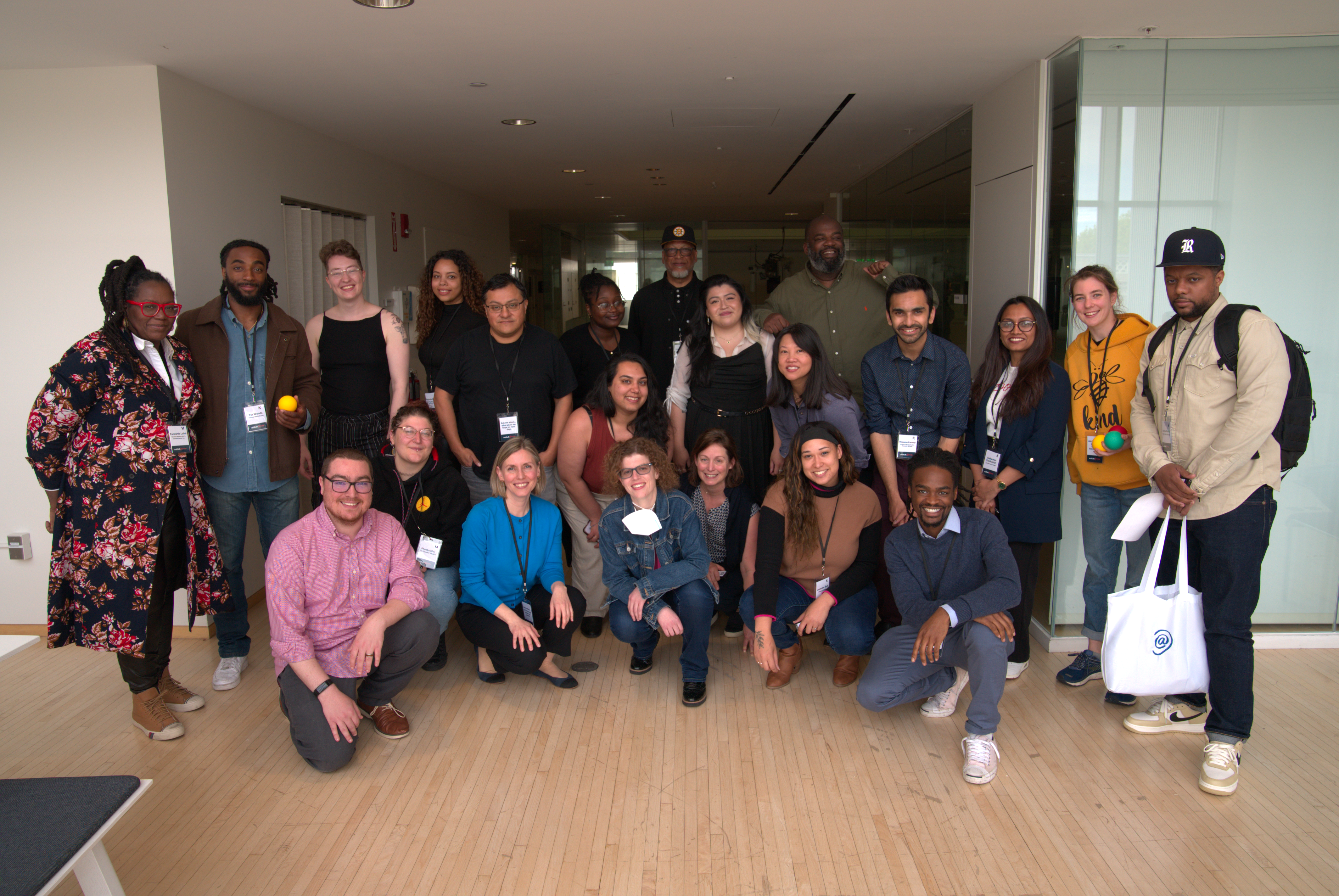
CCC gathered local community-based organizations to explore: How might we transform Boston into Listening City?
The MIT Center for Constructive Communication, with support from the Robert Wood Johnson Foundation, is growing a network of local key stakeholders that will invite membe…
News
Translational research

Second annual CCC in-person event: Trust and Human Connection in the Age of Social Networks and AI
On May 7, 2024 more than 150 attendees, including many from CCC’s closely affiliated non-profit, Cortico, spent a full day at MIT engaging in conversation and explorati…
News

Deb Roy’s Atlantic article proposes healthy social networks
In The Atlantic, CCC Director Deb Roy writes about the very real threat today’s social media platforms pose to our democracy, and presents a far less toxic alternative:…
News

MIT CCC graduate students and research staff present at the 10th International Conference for Computational Social Science (IC2S2)
CCC graduate students Belén Saldías, Hope Schroeder, Elinor Poole-Dayan, Will Brannon, Hang Jiang, and CCC research engineer Doug Beeferman, presented at the 10th Inter…
News
Research

How to Tackle Truth Decay | The Atlantic | Deb Roy
The next stage of truth decay is that those who no longer trust the scientists and technocrats search for alternative sources of information, “truth” from outside the…
News

CCC and DemocracyNext hosted the First-Ever Tech-Enhanced Student Assembly
The MIT Center for Constructive Communication (CCC) and the non-profit DemocracyNext came together to design and implement the first tech-enhanced and student-focused ver…
News

CCC and DemocracyNext Announce Tech-Enhanced Pop-Up Lab to Advance Citizens’ Assemblies
In an era of technological transformation in which social media and generative AI are disrupting our processes of communication and democracy, the MIT Center for Construc…
News

CCC’s RealTalk@MIT Part of Campus-Wide Efforts to Encourage Civil Discourse
MIT Chancellor Melissa Nobel notes CCC’s RealTalk@MIT efforts as part of the Institute’s response to addressing antisemitism and Islamophobia through MIT’s new “Standing…
News

Big Tech’s Effect on Democracy | Democracy360
The relationship between technology and democracy has become increasingly complex from the proliferation of social media to recent advances in AI. Kara Swisher moderates…
News

MIT Center for Constructive Communication’s Work Featured on Night Owls Podcast
MIT Center for Constructive Communication (CCC) and its nonprofit collaborator Cortico are at the forefront of using technology and dialogue to foster deeper connections…
News

Study: Some language reward models exhibit political bias
Large language models (LLMs) that drive generative artificial intelligence apps, such as ChatGPT, have been proliferating at lightning speed and have improved to the poin…
News

CCC and DemNext take the first step towards developing a more transparent, inclusive democratic process
In a landmark achievement, MIT CCC and DemocracyNext have collaborated on the first-of-its-kind, tech-enhanced citizens’ assembly in Deschutes County, Oregon. 12,750 in…
News

CCC and FRONTLINE launched a listening experiment to build a social dialogue network with youth
In collaboration with FRONTLINE, the PBS documentary series produced at GBH in Boston, the MIT Center for Constructive Communication (CCC) has been exploring how small g…
News

realtalk@MIT: Using AI to bring human conversation to life
In today’s digital age, words and information are everywhere—flooding our feeds, congesting our inboxes, and pinging us with text messages. Yet, written words can nev…
News

CCC launched realtalk@MIT for incoming students to connect, learn, and share their experiences
In August, CCC trained over 70 students to effectively facilitate small-group conversations, also recording and highlighting many of these conversations on the newly deve…
News

CCC gathered local community-based organizations to explore: How might we transform Boston into Listening City?
The MIT Center for Constructive Communication, with support from the Robert Wood Johnson Foundation, is growing a network of local key stakeholders that will invite membe…
News
Translational research

Second annual CCC in-person event: Trust and Human Connection in the Age of Social Networks and AI
On May 7, 2024 more than 150 attendees, including many from CCC’s closely affiliated non-profit, Cortico, spent a full day at MIT engaging in conversation and explorati…
News
Opportunities
Student Worker: Qualitative Data Analyst
Posted on 03.24.2025
We are seeking student workers to assist with qualitative analysis of community conversation transcripts. No prior research experience is required—training will be provided!
Opportunity
Student Worker Open Position: Web Developer & Designer
Posted on 03.24.2025
Design and develop a custom, branded website that will serve as a home for the realtalk@MIT initiative.
Opportunity
Student Worker: Qualitative Data Analyst
Posted on 03.24.2025
We are seeking student workers to assist with qualitative analysis of community conversation transcripts. No prior research experience is required—training will be provided!
Opportunity
Student Worker Open Position: Web Developer & Designer
Posted on 03.24.2025
Design and develop a custom, branded website that will serve as a home for the realtalk@MIT initiative.
Opportunity
Student Worker: Qualitative Data Analyst
Posted on 03.24.2025
We are seeking student workers to assist with qualitative analysis of community conversation transcripts. No prior research experience is required—training will be provided!
Opportunity
Student Worker Open Position: Web Developer & Designer
Posted on 03.24.2025
Design and develop a custom, branded website that will serve as a home for the realtalk@MIT initiative.
Opportunity
Recent Projects

Bridging Dictionary
Exploring LLM capabilities to explain concepts/definitions to various audiences
Project
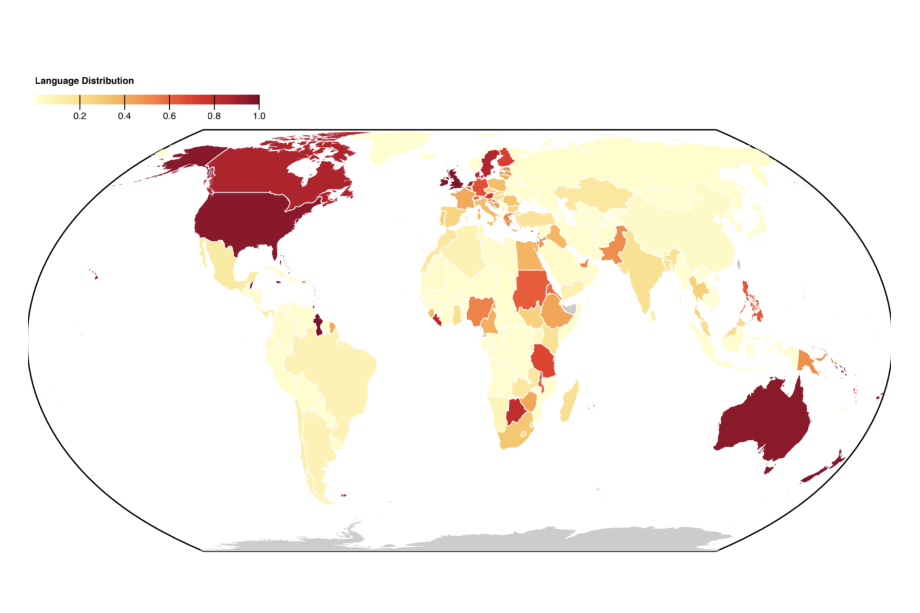
Data Provenance for AI
A massive audit of 1800+ AI text datasets, tracing their provenance and composition from origin to creation.
Project
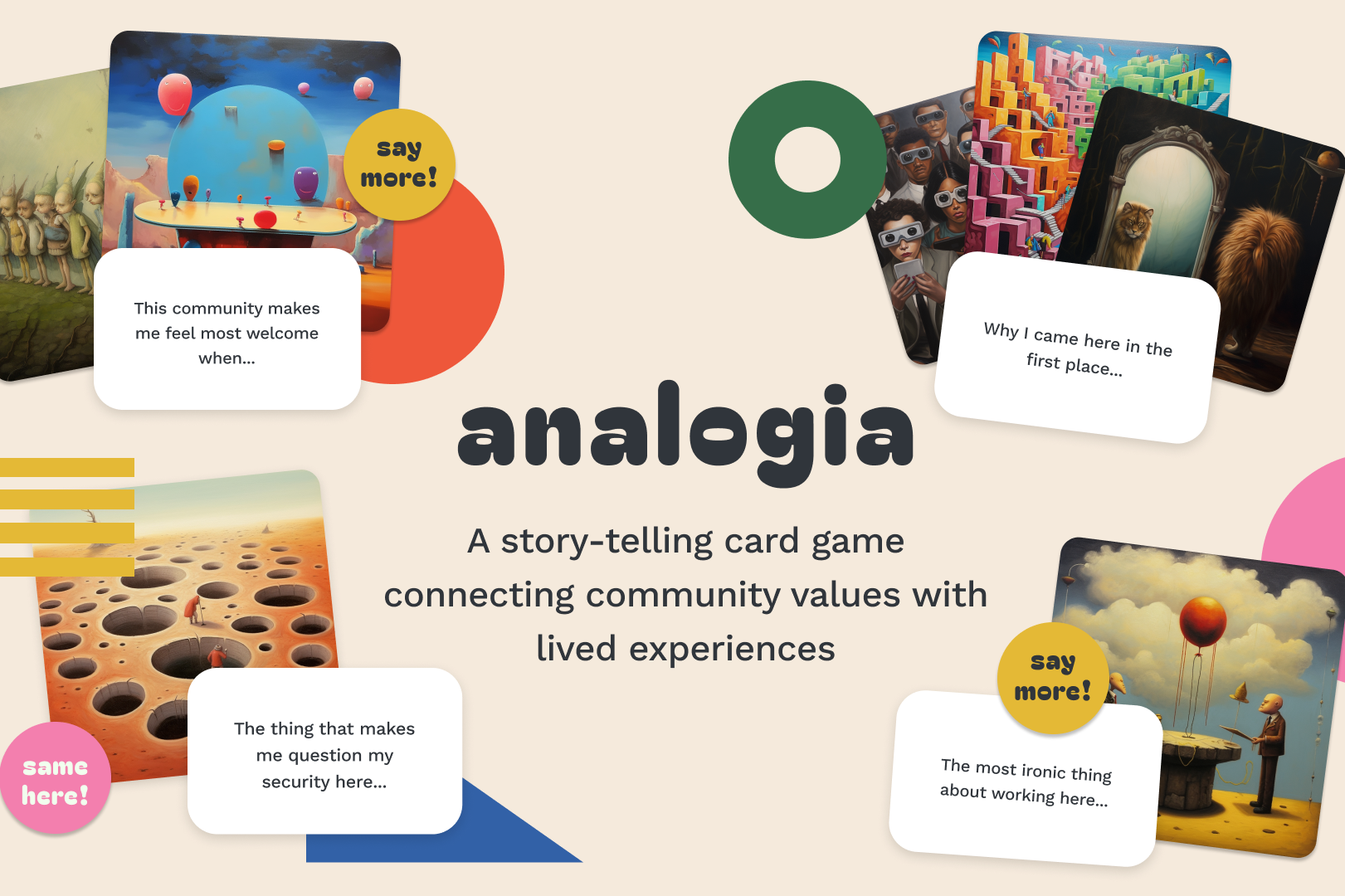
Analogia
A story-telling card game generated from community data which helps make speaking personally and emotionally easy and fun
Project
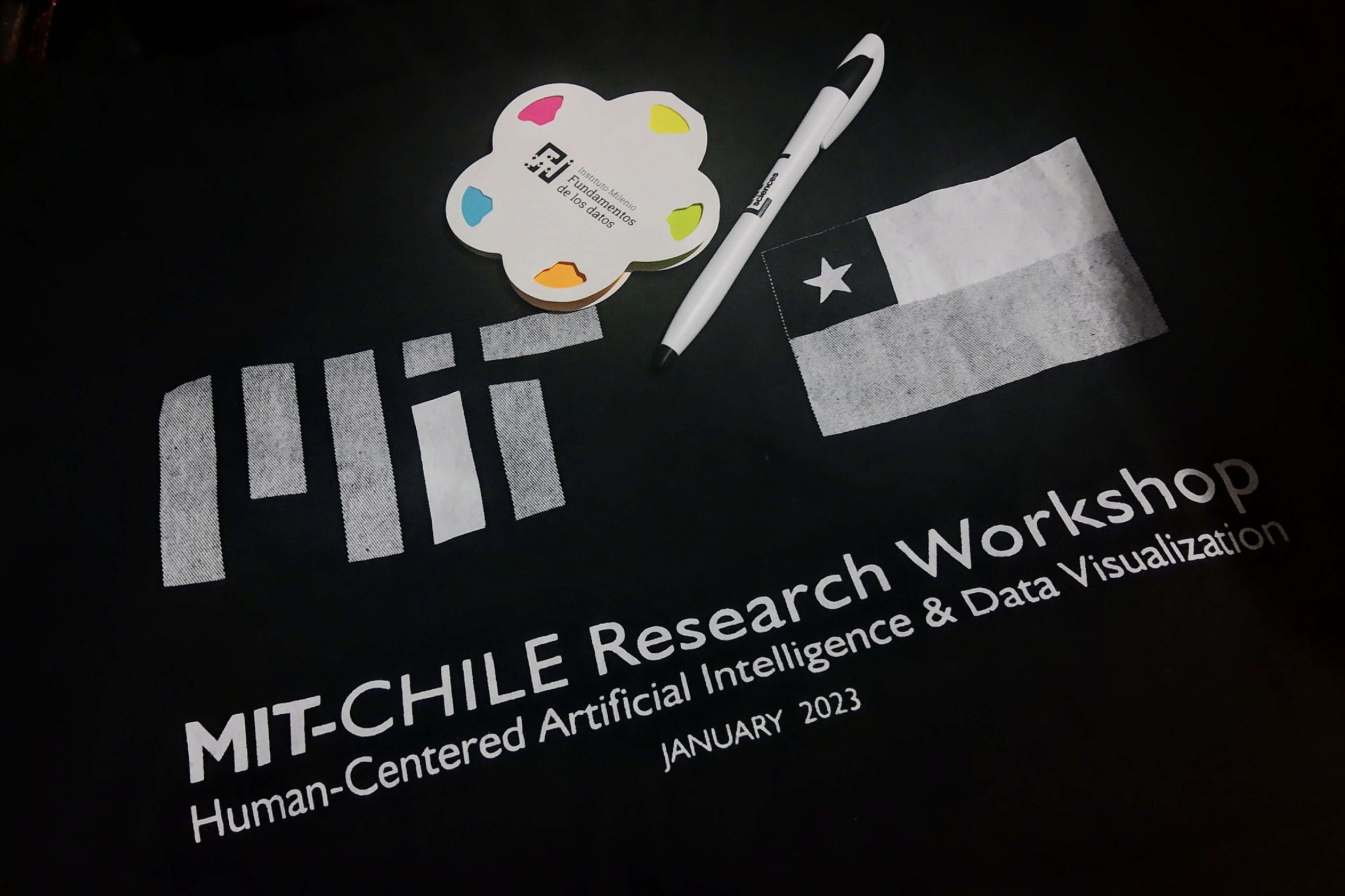
CCC at MIT-Chile
In January 2023, CCC PhD Candidates Belén Saldías and Maggie Hughes hosted several workshops on Human-Centered Machine Learning, Natural Language Processing, Data Visua…
Project
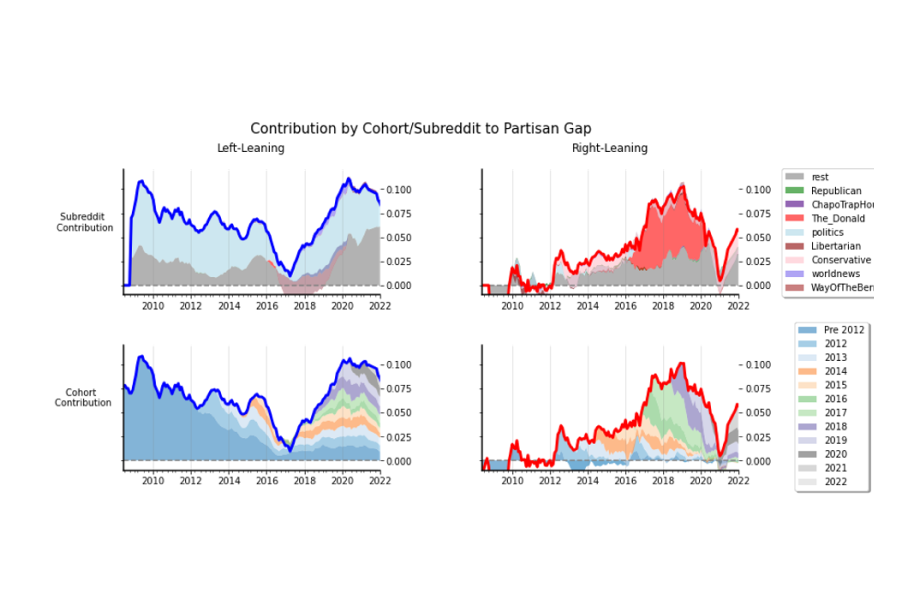
Affective polarization
Characterizing affective polarization on Twitter and Reddit – how it has evolved over time and which topics incite more polarized responses.
Project
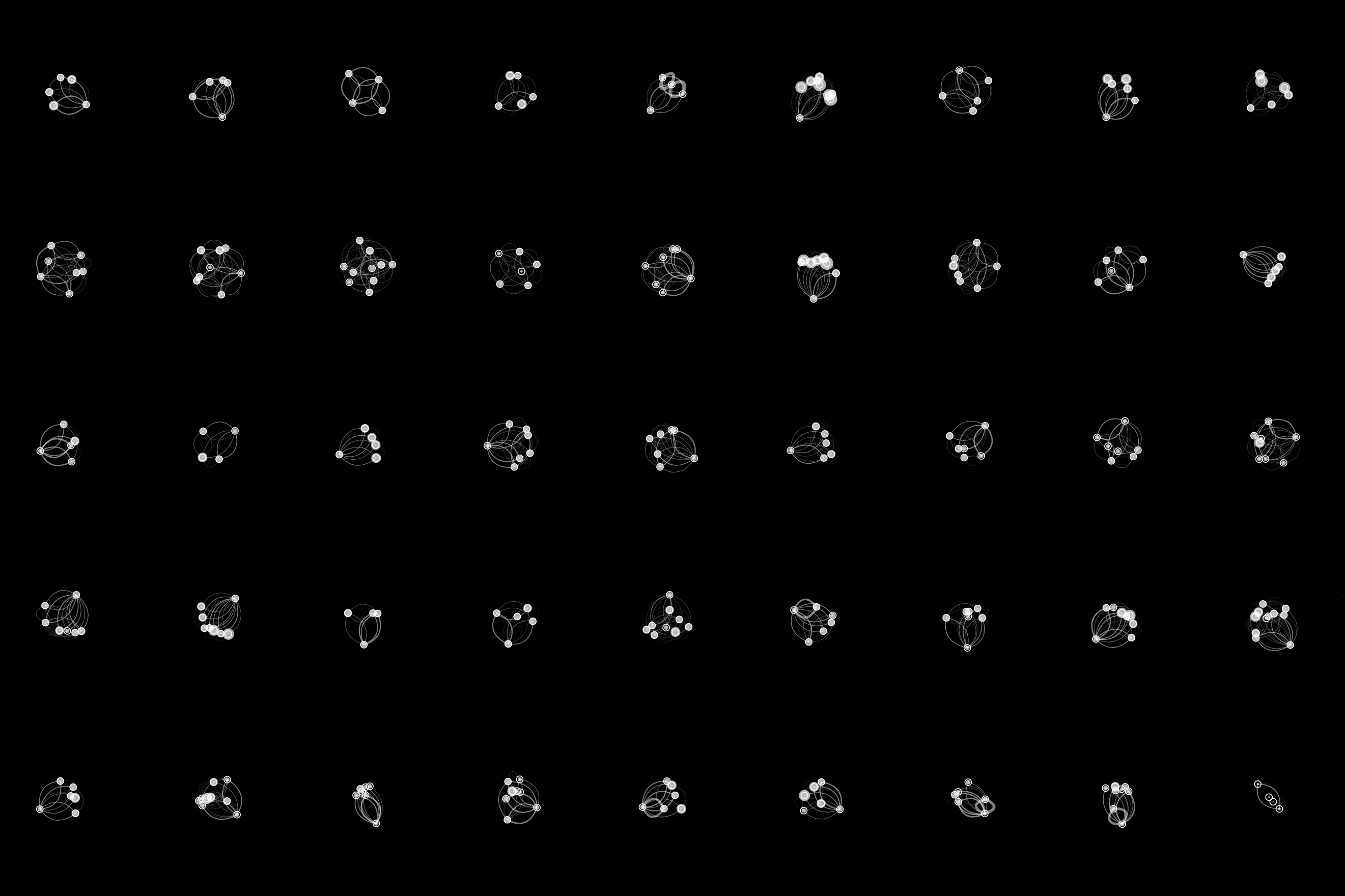
Conversation Flowers
Exploring conversation health and dynamics using natural language processing and data visualization
Project
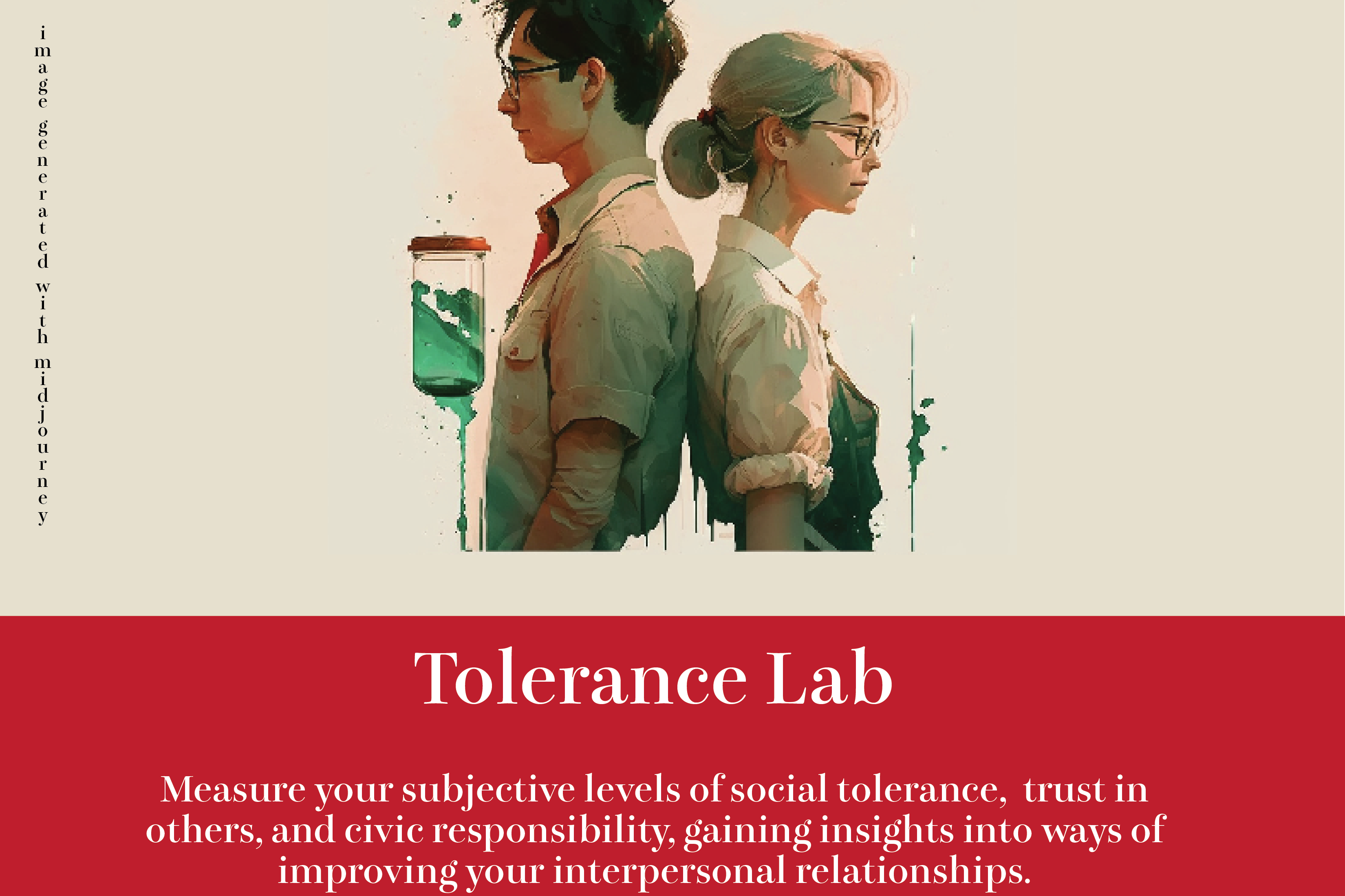
Tolerance Lab
Exploring the ways in which we respond differently to statements of opinion and statements of experience.
Project

Bridging Dictionary
Exploring LLM capabilities to explain concepts/definitions to various audiences
Project

Data Provenance for AI
A massive audit of 1800+ AI text datasets, tracing their provenance and composition from origin to creation.
Project

Analogia
A story-telling card game generated from community data which helps make speaking personally and emotionally easy and fun
Project

CCC at MIT-Chile
In January 2023, CCC PhD Candidates Belén Saldías and Maggie Hughes hosted several workshops on Human-Centered Machine Learning, Natural Language Processing, Data Visua…
Project

Affective polarization
Characterizing affective polarization on Twitter and Reddit – how it has evolved over time and which topics incite more polarized responses.
Project

Conversation Flowers
Exploring conversation health and dynamics using natural language processing and data visualization
Project

Tolerance Lab
Exploring the ways in which we respond differently to statements of opinion and statements of experience.
Project

Bridging Dictionary
Exploring LLM capabilities to explain concepts/definitions to various audiences
Project
